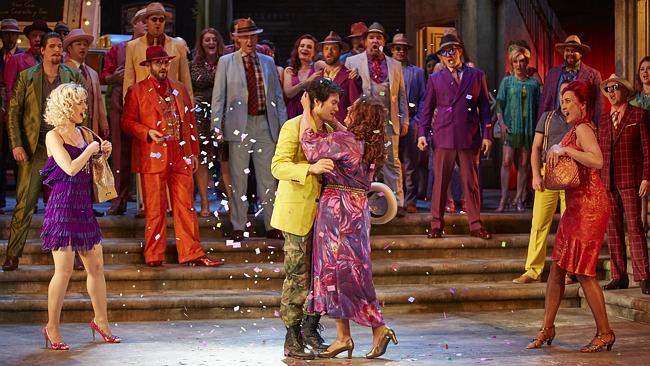John Bell production of Bizet’s Carmen is completely believable
In tackling Bizet’s Carmen, director John Bell wanted to explore the work on his own terms.

In tackling Bizet’s Carmen, director John Bell wanted to explore the work on his own terms.
As with his 2013 production of Tosca, Bell moved the opera away from its usual setting. Whereas the former was set in an exact place and time (Rome, 1943), his new update is more oblique: “somewhere resembling today’s Havana.”
Though Bell deliberately avoided a specific setting, he and his creative team got the details right. As a result, their production fully convinced.
Michael Scott-Mitchell’s drab, decaying backdrop was seamlessly transformed into a vibrant series of street scenes by Teresa Negroponte’s garish costumes, Trent Suidgeest’s inventive lighting designs and Kelley Abbey’s dynamic choreographic blend of street dance and contemporary dance styles.
Clever modern touches abounded. Khaki-clad soldiers used plastic riot shields to quell Act I’s cigarette factory disturbance, Lillas Pastia’s Act II tavern became a pop-up bar emerging from a Kombi van and the crowd clamoured for selfies with Escamillo during his Toreador Song.
Where Bell’s production really delivered was in its dramatic force and emotional power. Too often, Carmen can seem like a selfish, heartless femme fatale and Don Jose a pathetic, obsessive loser. Consequently, their love story fails to touch one’s heart.
Instead, Bell and his two leads made the trajectory of their tragic tale completely believable.
As Carmen, French mezzo soprano Clementine Margaine was a subtly seductive free spirit rather than a sexually supercharged siren. She was manipulative and teasing, but also genuinely attracted to Don Jose. When she lost interest, Margaine suggested a hint of remorse lay behind her rejection. Vocally, Margaine was outstanding. She displayed superb dynamic control and curvaceous line, cleverly infusing her alluring, dark-hued timbre with a complex range of colours.
As Don Jose, Korean tenor Yonghoon Lee was equally impressive. He sustained firm-voiced power and piercing clarity while his elegant phrasing and impassioned intensity created a powerful account of Act II’s Flower Song.
Lee’s realisation of Don Jose also fitted Bell’s conception. Overwhelmed by his feelings for Carmen, Lee compellingly conveyed the turbulent emotional conflicts that ultimately tore his character apart. In contrast, the two main supporting roles disappointed. Though initially bright-toned, soprano Natalie Aroyan (Micaela) lost focus and increasingly sounded strained. Michael Honeyman was an insipid Escamillo, lacking charisma and unable to overcome persistent vocal tightness.
Fortunately, the smaller supporting roles were strongly sung, the Opera Australia chorus impressed and conductor Andrea Molino and the orchestra provided swift, sparkling and stylish accompaniments.
Carmen; by Georges Bizet. Director: John Bell. Conductor: Andrea Molino. Joan Sutherland Theatre, Sydney Opera House. June 16; Tickets: $44-$350. Bookings: (02) 9318 8200. Duration: 2hrs 50 mins plus interval. Until August 12.


